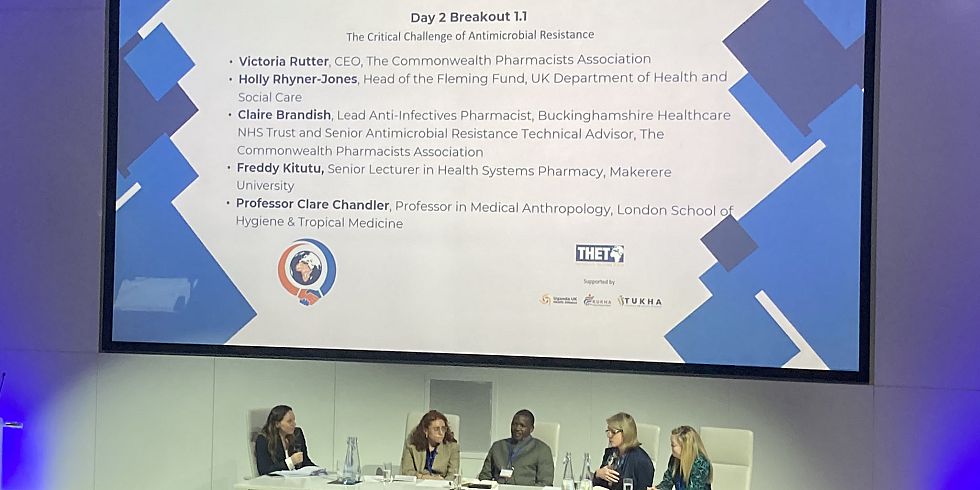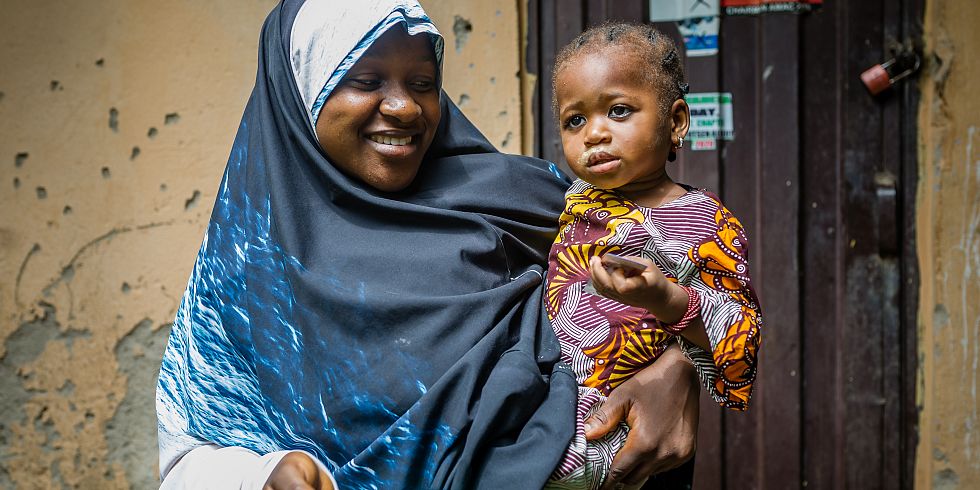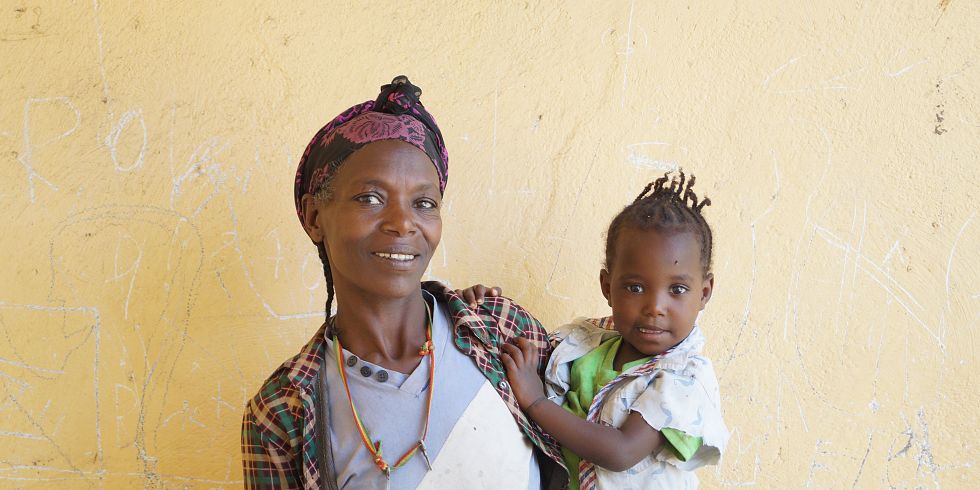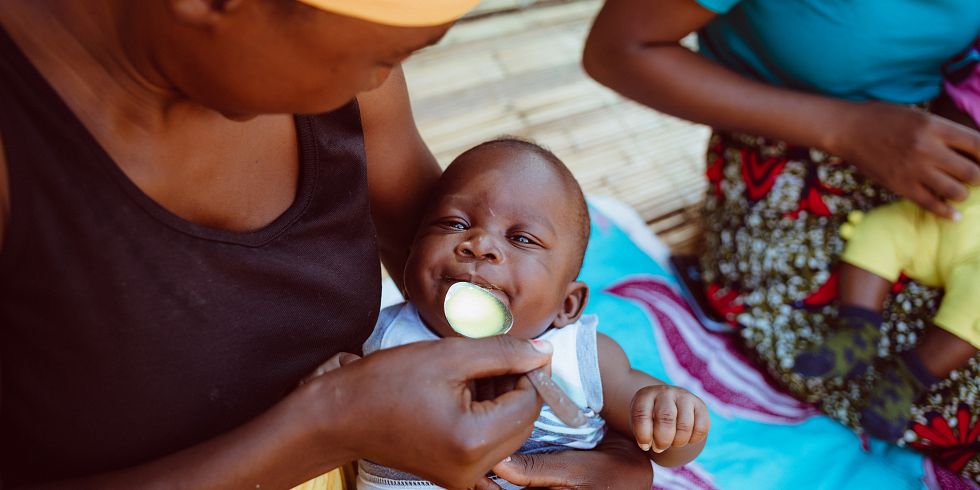Latest News
Months: Jan Feb Mar Apr May Jun Jul Aug Sep Oct Nov Dec

New paper highlights the role of the commercial sector in net coverage
16 December 2014Malaria Consortium is pleased to release a new Learning Paper on developing a long lasting insecticidal net retail (LLIN) market in Nigeria, highlighting how the commercial sector can help to expand the coverage of nets in Nigeria…

Drug-Resistant Malaria: Elimination is the Answer (Politics Home)
11 December 2014This article was originally published on Politics Home.
With drug-resistant malaria spreading in Southeast Asia, Malaria Consortium calls for the international community to accelerate efforts to eliminate the disease.
Progress i…
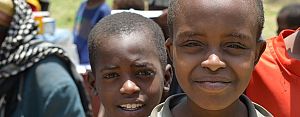
Scale-up of effective malaria control dramatically reduces deaths
9 December 2014The World Malaria Report 2014 shares the good news, but warns the fight is far from over
The World Malaria Report 2014, released today by the World Health Organization, was launched in the UK Parliament in the presence of the Duk…
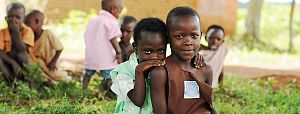
Report shows impressive progress in reducing malaria cases and deaths
9 December 2014(London) Malaria Consortium welcomes the release of the World Health Organization’s 2014 World Malaria Report today and the encouraging news it delivers on the progress made toward reaching global targets to control and elim…

Report shows impressive progress in reducing malaria cases and deaths (Politics Home)
9 December 2014This article was originally published on Politics Home.
(London) Malaria Consortium welcomes the release of the World Health Organizations 2014 World Malaria Report today and the encouraging news it delivers on the progress ma…

Malaria Consortium at the Joint International Tropical Medicine Meeting 2014
4 December 2014Malaria Consortium gave a number of presentations at the Joint International Tropical Medicine Meeting (JITMM 2014) and the 8th seminar on Food- and Water-borne Parasitic Zoonoses (FBPZ8) in Bangkok from December 2-4.
This year&r…
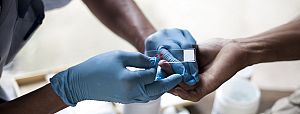
Malaria Consortium promotes knowledge sharing in its efforts to eliminate malaria
25 November 2014Malaria Consortium is pleased to announce that we have shared our research portfolio on the newly launched MESA Track database.
Malaria Eradication Scientific Alliance (MESA), with whom Malaria Consortium is a collaborating partn…

UK government commits to new health systems strengthening framework
24 November 2014The British government has reaffirmed its commitment to supporting the development of strong, sustainable and equitable health systems in developing countries. This comes in response to the International Development Committee&rsqu…

Diagnosing pneumonia - determining the best tools for use in community settings
19 November 2014In early November, Malaria Consortium held a highly successful symposium on access to better diagnostic tools for pneumonia. Held at the annual American Society of Tropical Medicine and Hygiene (ASTMH) meeting in New Orleans, the …
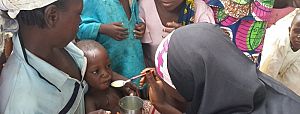
Seasonal malaria chemoprevention project officially kicks off
17 November 2014ACCESS-SMC, a UNITAID-funded project, led by Malaria Consortium in partnership with Catholic Relief Services, was officially launched at a meeting in Uganda last month. It is supporting National Malaria Control Programmes across t…
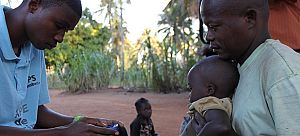
Malaria Consortium says every breath counts in its fight against pneumonia
12 November 2014London, 12 November 2014 - On this sixth annual World Pneumonia Day, Malaria Consortium and its partners are organising different events throughout the world to raise awareness on pneumonia, the biggest killer of children under th…
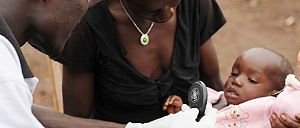
Pneumonia prevention and care available for every child is key to defeat world's #1 infectious killer of children
11 November 2014Global Coalition Against Child Pneumonia Press Release
Pneumonia prevention and care available for every child is key to defeat world’s #1 infectious killer of childrenOn the sixth annual World Pneumonia Day, the Global…

Bill Gates commits to eradicating malaria in his lifetime
3 November 2014In the opening keynote speech of the annual meeting of the American Society of Tropical Medicine and Hygiene, Bill Gates called upon the international community to drive towards eradicating malaria in this generation, calling…

Malaria Consortium at ASTMH
28 October 2014Malaria Consortium at the American Society of Tropical Medicine and Hygiene meeting in New Orleans, November 3 - 6
Malaria Consortium will be giving a number of presentations at the 63rd annual American Society of Tropical Medici…
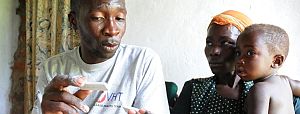
Delivering health services to children through integrated community case management in Uganda
23 October 2014Malaria Consortium is pleased to announce that Agnes Nanyonjo, Research Officer in our Uganda office, has completed her doctoral thesis on 'Delivering health services to children through integrated community case management in Uga…

Malaria report announces new era in fighting the disease
14 October 2014London, 14 October - We are at a tipping point in the fight against malaria and the UK government must renew its commitment to beat this preventable and treatable disease.
According to a new report, Malaria in 2014: An Unpreceden…

Malaria Consortium presents at the Third Global Symposium on Health Systems
3 October 2014Malaria Consortium was well represented at this week’s Third Global Symposium on Health Systems Research in Cape Town, which ran from 30 September until 3 October 2014. The conference was attended by 1,700 researchers,…
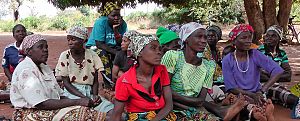
Tackling neglected tropical diseases within the community
24 September 2014Structured discussions known as community dialogues are being used in communities in Mozambique as a way of improving health-seeking behaviours and knowledge surrounding schistosomiasis – one of the most widespread and harmf…
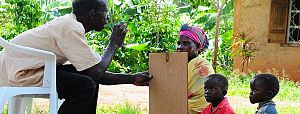
InSCALE: Advocating for increased iCCM coverage in Uganda
23 September 2014Three quarters of deaths in children under five are caused by malaria, diarrhoea and pneumonia often because access to quality health care is hardest in areas where the need is greatest. Uganda has one of the highest infant mortal…

Fake medicines and malaria
18 September 2014In 2012, the World Health Organization (WHO) estimated that there were 207 million cases of malaria, which killed approximately 627,000 people – mostly children in sub-Saharan Africa.
The best weapon for treating malaria is…
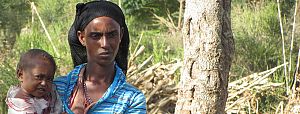
Legal commitment to spend 0.7% on aid moves one step closer
17 September 2014On Friday, the UK’s commitment to spend 0.7 percent of Gross National Income (GNI) on international development moved one step closer to being enshrined in law, after 166 MPs voted in favour of the bill during its second rea…

Uganda launches test kits project to boost malaria treatment in private health sector
16 September 201416 September - Malaria Consortium, in partnership with the Ministry of Health and the National Drug Authority, WHO and other NGOs, has launched a $6.2 million (about £10.1 million) project to create a private sector market f…

Community dialogues in Zambia - in pictures
2 September 2014The success of health interventions hinges on the involvement of affected communities. One method of encouraging engagement is through community dialogues, which gather villagers to discuss and find local solutions to health chall…
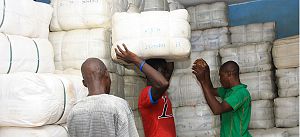
Harmonisation: lessons for improving donor and partner support for malaria control
22 August 2014For most large-scale health programmes, harmonisation amongst partners is key. When it comes to disease control, this is all the more essential. As organisations work with limited resources and across multiple countries, they have…
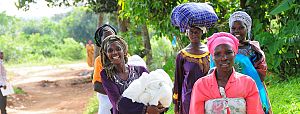
Historic campaign delivers mosquito nets to every household across Uganda
18 August 2014A universal LLIN campaign to distribute 21 million nets across Uganda reached completion this weekend and was marked at an event in Kampala.
The first distribution of its kind in Uganda, the 16 month campaign represents a signifi…

Orientation on external quality assurance for malaria diagnostics
12 August 2014The Ugandan Ministry of Health, through funding from the Global Fund to Fight AIDS, Tuberculosis and Malaria, is rolling out external quality assurance (EQA) for malaria diagnostics across the country. Quality control reduces the …
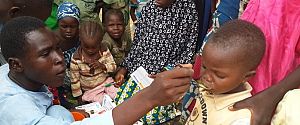
Malaria Consortium's seasonal malaria chemoprevention projects in Africa
7 August 2014In the Sahel region of Africa, which covers a broad swathe of land south of the Sahara, malaria remains the leading cause of severe illness and death in young children. A high proportion of the malaria infections in this region ta…
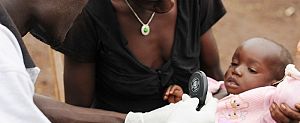
Meetings in Geneva seek to address challenges in the detection of the symptoms of pneumonia
21 July 2014Recently, Malaria Consortium hosted a series of meetings in Geneva, bringing together global experts in child health, community case management, and diagnostics. During the meetings, the experts discussed the current global situat…
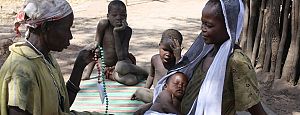
Improving pneumonia diagnostics through the use of counting beads
15 July 2014Pneumonia is the leading cause of death in children worldwide. Every year it kills an estimated 1.2 million young children, accounting for approximately 18 percent of all deaths in this age group – more than AIDS, malaria an…
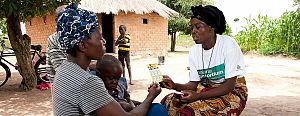
Getting research evidence into health policy and practice - let's talk
14 July 2014With the support of many health-related journal editors, BioMed Central hosted the inaugural ‘Health Services Research: Evidence-based practice’ conference in London from 1-3 July, bringing together distinguished leade…
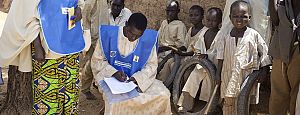
Private Members Bill aims to establish 0.7% on aid in law
10 July 2014Liberal Democrat Michael Moore MP is sponsoring a Private Members Bill to enshrine in law the UK’s commitment to spend 0.7 percent of Gross National Income (GNI) on international development.
Speaking of his reasons for cho…
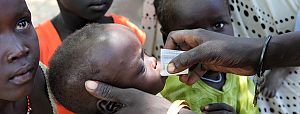
South Sudan faces growing public health crisis
9 July 2014On the third anniversary of South Sudan’s independence, the humanitarian situation remains critical for the country and it is on the brink of famine and facing a public health crisis.
The UN secretary-general, Ban Ki-moon&r…

Photo story - village health clubs improving child health in Uganda
27 June 2014Community health workers are becoming an increasingly important part of the health system in sub-Saharan Africa, especially in low-resource settings. Low motivation and under-performance have been found to be some of the key barri…

Pioneering Progress: celebrating UK leadership in the fight against malaria
20 June 2014At the launch of the Pioneering Progress Exhibition in the UK Houses of Parliament this week, MPs and Peers came together to celebrate the UK’s leading role in the fight against malaria. Organised by the UK Malaria Advocates…

Malaria Consortium seeks to advance discussions on pneumonia diagnostics
17 June 2014Malaria Consortium is hosting a series of meetings in Geneva this week, bringing together global experts in child health, community case management and health technology with diagnostics device developers. The organisation hopes t…
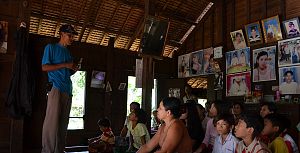
ASEAN Dengue Day: the rise of a killer disease
13 June 2014London, June 13th: Although it may be relatively unknown to many and is one of the so-called ‘neglected tropical diseases,’ dengue is one of the fastest growing emerging infectious diseases in the world. Over 40 percen…

Malaria Consortium presents at webinar on community health worker motivation and performance
16 May 2014At an online webinar on Wednesday, members of the inSCALE project team spoke about community health worker (CHW) motivation and performance. The webinar outlined some of the main obstacles that CHWs face in their work and what is …
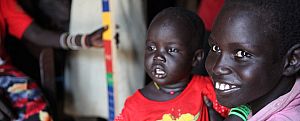
Invitation to NTD discussion at the World Health Assembly 22 May
15 May 2014
The power of integration: achieving the control and elimination of neglected tropical diseases
World Health Assembly - Thursday 22 May 2014
Hosted by the Federal Ministry of Health of Nigeria in partnership with the UK…
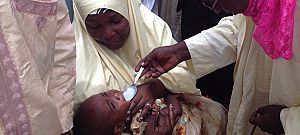
Largest grant yet for seasonal malaria chemoprevention
8 May 2014Largest grant yet for seasonal malaria chemoprevention
UNITAID has awarded up to $67 million to Malaria Consortium to oversee the largest-yet global programme to increase seasonal malaria chemoprevention (SMC) across the Sa…
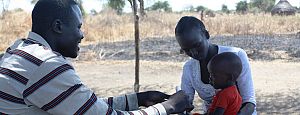
Report shows ending child deaths from hunger in a generation is now possible
29 April 2014Child deaths from acute malnutrition could be ended in a generation, according to a new global campaign launched on the 24 April by a coalition of leading international development organisations.
The campaign called ‘Genera…
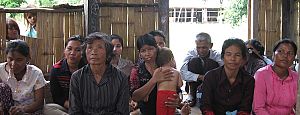
Improving malaria outcomes through positive deviance approach
28 April 2014Malaria Consortium’s new Learning Paper released today reflects on our work to contain the impact of malaria on mobile and migrant populations in north-west Cambodia, through an approach known as positive deviance. The proje…
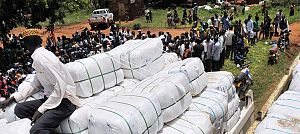
World Malaria Day 2014: a message from Charles Nelson, Chief Executive
25 April 2014On World Malaria day 2014, we certainly have some reasons to be optimistic, as progress is undoubtedly being made. Since 2000, child death rates from malaria have been cut in half and more than 3.3 million lives saved. Four countr…
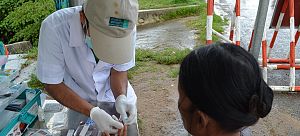
Malaria Consortium stresses importance of fighting artemisinin resistance in Asia
25 April 2014At the London School of Hygiene & Tropical Medicine (LSHTM) symposium yesterday entitled ‘Artemisinin resistance – threats & responses,’ Dr Sylvia Meek, Malaria Consortium Technical Director, stressed the…
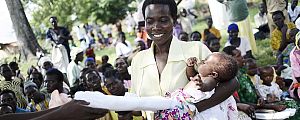
World Malaria Day 2014: Lessons from the past - can malaria ever be eradicated?
24 April 2014History repeats itself if we don’t learn from our mistakes. World Malaria Day offers a chance not only to plan for the future, but also to learn from the past. Since 2007, when global leaders promised a renewed commitment to…
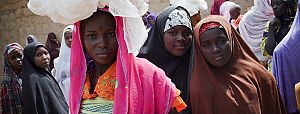
Creating demand in Nigeria – a new learning paper
14 April 2014When it comes to reducing malaria transmission, supply and demand are both crucial components of any prevention and case management programme. Past experience has proven that supplying governments, health facilities, service deliv…

World Health Worker Week – in pictures
10 April 2014April 7 not only marked World Health Day, but also the beginning of World Health Worker Week, organised by the Global Health Workforce Alliance. Only in its second year, World Health Worker Week puts the spotlight on those who mak…

Understanding vector behaviour, World Health Day 2014
7 April 2014On World Health Day 2014, Malaria Consortium is highlighting the increasing risk to populations worldwide from vector-borne diseases. More than a billion people are infected each year from conditions such as malaria, dengue and ye…
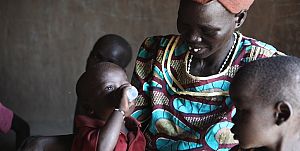
Renewed commitment to step up the fight against neglected tropical diseases
4 April 2014At an event in Paris, Uniting to Combat NTDs: A Conversation on Progress, leading global health figures looked at the progress made against 10 neglected tropical diseases (NTDs) in the last two years and released the second progre…
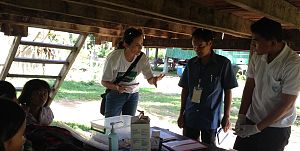
Malaria Consortium joins the WHO Malaria Expert Group on Surveillance and M&E
2 April 2014Malaria Consortium joins the WHO Malaria Expert Group on Surveillance and M&E
Malaria Consortium is delighted to have been invited to join the World Health Organization’s Global Malaria Programme’s Technical Exper…
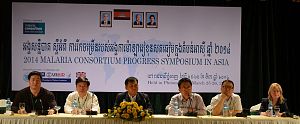
Keeping artemisinin resistance high on the agenda
28 March 20142014 Malaria Consortium Progress Symposium in Asia
Despite real progress towards malaria elimination in this part of Asia, the Greater Mekong Sub-region continues to face the worrying challenge presented by artemisinin resistance…
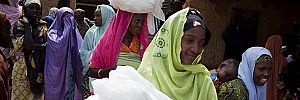
Building up the commercial net sector
19 March 2014The equitable distribution of insecticide treated nets (ITNs) to prevent malaria transmission in Africa has always proven a challenge for governments and public health organisations alike. Not only are populations often spread out…

DFID called to increase support to Myanmar
14 March 2014The International Development Committee has released its final recommendations for the future of the UK Government’s support to Myanmar, following a six month consultation where Malaria Consortium gave both written and oral …
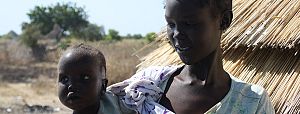
iCCM – Reviewing the evidence
3 March 2014Today marks the beginning of a three-day conference in Accra, Ghana to consider the evidence of the impact of integrated community case management (iCCM) and its effectiveness as a community-based health solution.
The conference …

Malaria Consortium announces support to Fight the Fakes
28 February 2014Malaria Consortium is proud to announce their support to Fight the Fakes, a multi-stakeholder campaign to raise awareness about the dangers and the impact of fake medicines. Through supporting this campaign, Malaria Consortiu…
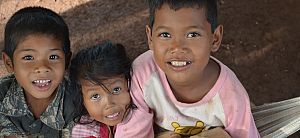
Malaria Consortium joins APMEN
27 February 2014Malaria Consortium is pleased to announce its membership of the Asia Pacific Malaria Elimination Network (APMEN).
Established in 2009, the network comprises 14 Asia Pacific country partners with the common goal of malaria elimina…

Malaria Consortium at 10: Celebrating a decade in disease control and child health
27 February 2014Malaria Consortium was founded in 2003 by a small team of people with a vision - to build the capacity of malaria-endemic countries worldwide to deal with a common and treatable disease that was devastating the lives of poor and v…

Malaria Consortium launches 10th anniversary report
24 February 2014Celebrating a decade in communicable disease control and child health
Malaria Consortium was founded in 2003 by a small team of people with a vision - to build the capacity of malaria-endemic countries worldwide to deal with a co…
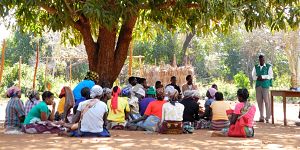
Malaria Consortium Receives Grant for Mozambique Neglected Tropical Diseases Project
16 January 2014Malaria Consortium is delighted to announce that it has received a Grand Challenges in Global Health grant from the Bill & Melinda Gates Foundation for an innovative community dialogue project in Mozambique to help reduce…
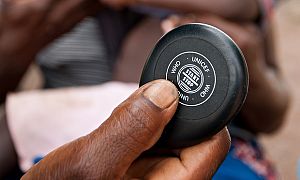
Minimising the development of antibiotic resistance
1 January 2014Increasing access to treatment goes hand-in-hand with efforts to prevent antibiotic resistance
In its recent report, the World Health Organization (WHO) called the spread of antibiotic-resistant bacteria a "growing public health …
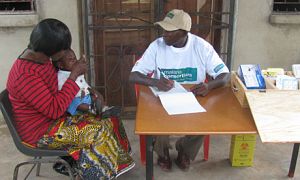
Getting rational about pneumonia
1 January 2014"Whilst it is the responsibility of individuals to ensure that drugs are used rationally, the consequences of irrational use are global," says Kirstie Graham. Photograph: Malaria Consortium
Malaria Consortium has been conduc…
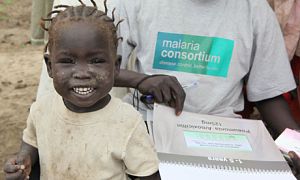
Antibiotic resistance: a ticking time bomb for public health?
1 January 2014With the spread of resistance to antibiotics, bacterial diseases are increasingly difficult to control and treat. Understanding resistance and identifying ways to control it are public health priorities
3-year old Nyana from Sout…

